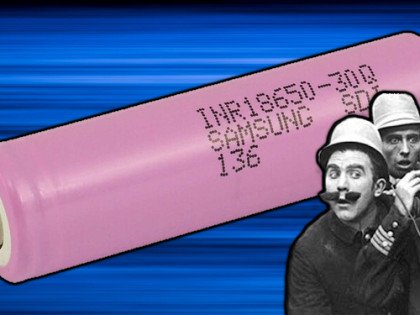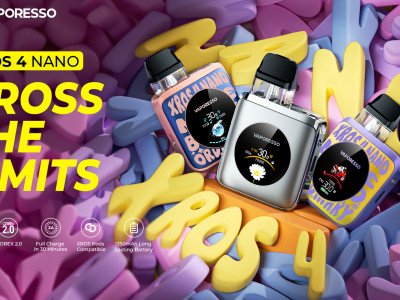Unlike Glantz, St.Helen doesn’t seek to troll advocates or academic experts. He also differs from the disgraced Stan in that he engages with advocates on social media. Following the publication of Glantz’ letter (covered in our other story today), Vaping 360’s Jim McDonald wrote with sadness: “Really sorry to see Gideon St. Helen's name on this ridiculous UCSF call for FDA to ban open-system vaping products.”
St.Helen responded promptly and, in the interest of understanding the opposition to vaping better, POTV is quoting his reply in full: “The e-cigarette debate is controversial and tempers flare often. However, cooler heads should prevail. The loud voices are often lumped into two camps: the so-called e-cigarette enthusiasts who present e-cigarettes as the magic bullet for the smoking epidemic. This camp focuses on smokers and minimizes any concerns about the toxicity of e-cigarettes or concerns about youth.”
“Some of these ‘enthusiasts’ are genuinely interested in the public's health. We're living in a capitalist society, so other interests are motivations for others too. The other camp is the e-cigarette pessimists. This group focuses a lot on the harms of e-cigarettes to kids, particularly that of nicotine addiction and potential gateway to smoking. Some in this camp talk up the toxicity of e-cigarettes, sometimes in exaggerated fashion.”
“Again, we can't question their (the pessimists) commitment to public health. Others have their own agenda also. I do understand that I have boiled these two camps down in simplistic form/terms, and there may be some nuances among "adherents" of either camps. (Stay calm).”
“What you may not know is that there is a third camp, and probably more, but I will focus on this third camp because that's where I fall, and it also explains why I joined in this particular public comment in response to FDA's call of how to make e-cigarettes safer.”
“I believe that e-cigarettes have **significant potential** to reduce the toll of tobacco cigarettes on the world population. My grandma died recently from oral cancer, even though she quit smoking many, many years before becoming ill. I also believe that we have a responsibility to protect our children and youth from being lured to cigarettes and ultimately becoming smokers. I have two young children.”
“Striking a balance between offering smokers an attractive off-ramp from smoking and keeping our youth from getting on that attractive on-ramp is tricky and complicated. The FDA's task of regulating e-cigarettes is complicated. We should show an appreciation of this.”
“Here's the lay of the land,” continued St.Helen as he listed out what he sees as facts:
- E-cigarettes are not nearly as toxic as tobacco cigarettes, for the simple fact that they do not emit many of the toxicants emitted in tobacco smoke, and if they do, the levels are considerably lower
- Questions remain about the effectiveness of e-cigarettes for smoking cessation at the population level. I have, however, spoken to many vapers who have quit smoking with e-cigarettes. Keep the latter in perspective. Don't minimize it. Also, don't exaggerate it
- If smokers switch completely to e-cigarettes, they would see a decreased disease risk. Dual users may not see that benefit unless they substantially reduce tobacco smoke intake (not cigarette reduction b/c people engage in compensatory smoking)
- (Shocker!) E-cigarettes are not non-toxic. Another way to say that is, e-cigarettes are toxic. Simple enough? They emit some toxic volatile organic compounds; they contain an addictive chemical; many of the flavours have not been shown to be safe for inhalation
- While e-cigarettes represent decreased risk to smokers, who are using a really toxic product (aka harm reduction), they likely increase the risk of disease for young users. How much risk? That risk shouldn't be minimized without data nor should it be exaggerated
- The PMTA is the law of the land and has to be filed by all manufacturers by Sept 9, 2020 (new date alert) if they want to introduce new products or keep what they currently have on the market (if they were introduced on the commercial market after Feb 15, 2017)
Addressing the letter directly, St.Helen went on to say: “[The] FDA specifically asked for ‘data and information on e-cigarette product design and ways to prevent consumers from modifying or adding substances to those products that were not intended by the manufacturers.’ This call is in the wake of the EVALI crisis, which we know was not related to **nicotine e-cigarettes** but to bootleg THC vapes that used vitamin E acetate as a diluent to stretch their products and increase their profit margins.”
“We also know that the design of e-cigarettes vary considerably from truly closed, tamper-proof systems to open tanks. The open systems are customizable and can facilitate use of products/flavours/substances that are not intended by the manufacturer.”
“Effective regulation doesn't just look back. Effective regulation anticipates. That's a pillar of toxicological risk assessment. So even though a toxic substance hasn't been added to e-cigarettes yet, it's possible. It's very possible. FDA has to preempt this.”
St.Helen then laid out how he thinks the public needs protecting.
“I do not support any outright ban of e-cigarettes. That's a non-starter for me. In fact, I believe that use of all illicit drugs should at least be decriminalised, if not legalised, but with strict, effective, data-driven regulations.”
“My community has borne the brunt of America's war on drugs. But we have to ensure that e-cigarettes are as safe as we can get them, with the realization that, in risk assessment, ‘safety’ is a relative term. We should not demand absolute safety, which clean air alone offers. We should also not accept every risk.”
Then St.Helen listed his suggestions of how to get to “safe e-cigarettes in a way that prevents modifications that may make them unsafe (my opinion, which doesn't mean I am correct and you are wrong). Stay calm.”
- The FDA should only permit, through the PMTA process, closed, tamper-proof e-cigarettes that have been shown to be safe
- The FDA should not approve open tank designs or refill e-liquids. This is controversial because the regular vape shops would take a hit. The market should be moved towards closed tank designs, and vape shops can partner with e-cigarette manufacturer to sell pre-filled, closed tank systems. Keep in mind that the goal is to develop products that are safe enough and can't be altered
- The FDA should regulate in a comprehensive manner the various factors that affect the temperature at which the e-liquid is heated. That includes: type of metals in the coil/atomizer, resistance, power level, etc. Since e-cigarettes vary, a one-size fit all approach won't work. They can't just cap power level. 30 Watts on one device heats differently on another
- Ban the sale of accessories by companies that are meant to be compatible with products approved by PMTA. For example, a few companies manufacturer JUUL-compatible pods. That should be banned, unless these companies can get a PMTA for their products. Again, the question FDA is asking is how to ensure that e-cigarettes are not altered and used in a way that's contrary to what the manufacturers intended
“Some have used the EVALI crisis to push outright bans on e-cigarettes, including flavours. I will not be surprised if that push doesn't intensify after we get over COVID-19. I don't think that's the prudent path. I think the prudent path is to ensure that products allowed on the market by PMTA protect the public's health and cannot be subsequently altered.”
“Finally, while I have many negative attributes, a positive one is I do not think I have the answers to every question, particularly one as complex and divisive as this. And I'm sure those attacking my position here know that. We need to figure this out together.”
Dimitris Agrafiotis, advocate and businessman, responded: “You make some valid points however you have not taken technology into consideration. Vaping was created by consumers. There is not one product that fixes everything. It’s the variety in hardware and flavours that help adults quit smoking. Also youth prefer closed systems so without any real information or data you are suggesting to keep on the market the desired by youth product and eliminate the products they cannot afford or conceal. I am really wondering if youth is really your motive.”
Gideon St.Helen needs praising for being willing to openly engage with vapers and advocates. While we may disagree with some of his opinions, having someone at the UCSF Centre for Tobacco Control Research and Education who is willing to listen might finally help break the log jam due to distrust and misinformation.
Related:
- Gideon St.Helen on Twitter – [link]
Dave Cross
Journalist at POTVDave is a freelance writer; with articles on music, motorbikes, football, pop-science, vaping and tobacco harm reduction in Sounds, Melody Maker, UBG, AWoL, Bike, When Saturday Comes, Vape News Magazine, and syndicated across the Johnston Press group. He was published in an anthology of “Greatest Football Writing”, but still believes this was a mistake. Dave contributes sketches to comedy shows and used to co-host a radio sketch show. He’s worked with numerous start-ups to develop content for their websites.
Join the discussion
Doctors call for ban
Doctors call for prescription-only vapes in a letter to The Times under the guise of protecting children – ignoring the impact a similar approach has had in Australia
Council Demands Disposable Ban
Sheffield City Council has written to the Secretary of State to demand that the government bans disposable single-use vapes
CoEHAR Writes to the European Commissioner for Health
The Centre of Excellence for the acceleration of Harm Reduction has written a letter to the European Commissioner for Health asking for a redefinition of anti-smoking policies
Stolen Samsung Warning
Lawyers acting on behalf of Samsung are reminding us not to sell you any of their batteries in case they’re used for anything and order us to warn you about stolen batteries because reasons











